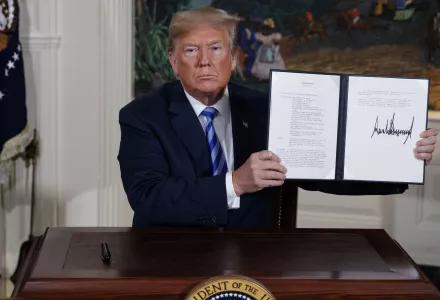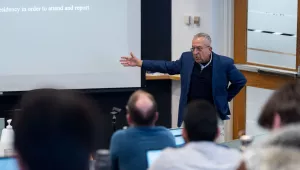With President Donald Trump's unilateral withdrawal of the United States from the Iranian nuclear agreement (JCPOA), the future of the deal is under serious question. Please join the Iran Project and The Project on Managing the Atom (MTA) for an expert-level roundtable analyzing the ramifications of this decision and the how leading international and regional players will react to these latest developments.
This panel discussion will include Gary Samore, Executive Director for Research at the Belfer Center; Sahar Nowrouzzadeh, Joint Research Fellow at the Belfer Center's Iran Project and Project on Managing the Atom; Hassan Ahmadian, Postdoctoral Fellow at the Belfer Center Iran Project; Steve E. Miller, Director, International Security Program; and other speakers TBA. Moderated by Belfer Center Iran Project Director, Payam Mohseni.
Expert Commentary
Hassan Ahmadian, Postdoctoral Research Fellow, Iran Project, Belfer Center for Science and International Affairs:
President Trump wants to isolate Iran and put it under the limelight as a threat to international peace and security in order to deprive Tehran from the benefits it sought from the JCPOA. But he is playing his cards in the worst way possible. By reinstating sanctions, he has already thrown much of his leverage against Iran away. This is not to say that Tehran will benefit from the collapse of the JCPOA – and surely not from the reinstating of sanctions. What Trump did, however, is to create challenges for the United States internationally and therefore can be of diplomatic value to Tehran for three reasons: first, instead of targeting Iran through its traditional leadership role in global multilateral arrangements, he unilaterally withdrew the United States from the agreement and disregarded the advice of European allies. Therefore, rather than bear the brunt of global pressure, Iran will have to confront a “rogue” US administration according to some Iranian analysts – with the world sympathizing with Tehran. In particular, Trump preferred his controversial partners in the Middle East--Saudi Arabia’s Crown Prince Mohammad Bin Salman and Israeli Prime Minister Benjamin Netanyahu, both of whom are facing domestic challenges at home--over traditional American allies in Europe. Second, Trump set himself up on the losing side of the JCPOA, with the US being the irresponsible party wrecking the agreement and Iran being the party honoring its words. Third, he bridged the gap between anti-American propaganda and the official U.S. position for the Iranian public as the United States is playing into Iran’s official narrative. One can barely hear a voice criticizing the Iranian government inside the country as the blame is squarely placed on the United States for the probable collapse of the deal
Steven E. Miller, Director, International Security Program, Belfer Center; Editor-in-Chief, International Security:
President Trump’s decision to withdraw from the JCPOA and openly violate the provisions of the agreement may not quite be a gift to Tehran, but it is at least as damaging to the United States as it is to Iran. It isolates the United States and positions it as the wrecker of the deal. It discredits the United States as a trustworthy negotiating partner – at least with Iran, if not more broadly. It divides Washington from its European allies, all of whom are deeply opposed to this move. It creates an opening for Iran to collaborate more closely with Europe, Russia, and China in arrangements that will exclude the United States. It offers Iran the opportunity to escape from the confining limits and intense scrutiny put in place by the JCPOA. It will require the United States to seek additional sanctions in an environment in which there is little sympathy for the US position and some respect for Iran’s compliance with the JCPOA. It raises the prospect of a world in which US sanctions are ineffective while Iran’s nuclear program steadily advances. It signals a return to the purely confrontational approach that for more than a dozen years failed to halt Iran’s nuclear progress. Iran may attempt to salvage the deal by continued cooperation with the other parties to the agreement, but if not then Trump’s decision will have created a world in which Iran’s nuclear program is much less constrained and much less inspected – and he will have paid a high price to do so.
Payam Mohseni, Director, Iran Project, Belfer Center for Science and International Affairs; Lecturer on Government, Harvard University Department of Government:
President Trump’s decision to withdraw the United States from the Iran nuclear deal is a strategic mistake with three major consequences: 1) it greatly undermines U.S. national interests by eroding its credibility, by splitting the United States from its European allies and the international community, by upending an agreement that effectively blocked Iran’s nuclear aspirations at the weapons level, and by wasting billions of dollars of political, financial, and human capital the United States invested to reach the JCPOA. 2) It erodes the pillars of the rules-based international system as it questions the independent power and diplomatic credibility of European states, especially if they are not able to safeguard the deal from American violations. Likewise, Trump’s decision undermines the value and significance of multilateralism and international institutions, especially those operating towards the global nuclear non-proliferation regime such as the IAEA. And, 3) it marks a turning point in the post-revolutionary history of modern Iran as the first major bitter experience of the country’s youth with the United States and the first direct public negotiation with America--inflaming Iranian nationalism, undermining the value of engaging the West, and shifting the domestic discourse to a hardline position. This was a gift to Ayatollah Khamenei as it undermines the platform of moderate President Rouhani, claiming he was right to tell everyone not to trust the Americans. Now Khamenei will turn to undermine the credibility of the Europeans by turning all eyes on the EU powers, before Iran uses the U.S. violation and withdrawal of the agreement to move beyond the deal.
Sahar Nowrouzzadeh, Joint Research Fellow, Iran Project and Project on Managing the Atom, Belfer Center for Science and International Affairs:
One of the key questions for U.S. policymakers will be how Iran’s nuclear and perhaps broader national security decision-making will be impacted by Trump’s decision, particularly as it was made in isolation from our P5+1 and EU partners and despite Iran’s verified compliance. After all, we’ve known for many years that Iran does not face insurmountable technical barriers to producing nuclear weapons, as the U.S. intelligence community has repeatedly confirmed publicly. Therefore, Iran’s political will and the result of a cost-benefit analysis of what it views as its core national security interests will continue to be a central question. Among the likely consequences of today’s decision will be that our ability to influence or incentivize Iran’s nuclear decision-making in a manner favorable to U.S. interests will be severely undermined going forward.
Gary Samore, Executive Director for Research, Belfer Center for Science and International Affairs; former White House Coordinator for Arms Control and Weapons of Mass Destruction:
President Trump thinks he can crash the nuclear deal, reimpose international economic sanctions, and force Iran to negotiate a better deal. He is mistaken. For now, Iran will try to salvage the JCPOA with the other parties to the deal (the Europeans, Russia, and China), promising to retain nuclear constraints if the other parties give assurances that they will resist secondary US sanctions. Over time, however, as secondary sanctions reduce the flow of economic benefits to Iran, Iran will threaten to unwind nuclear constraints under the JCPOA. However, Iran will be cautious to avoid nuclear actions that risk provoking a US military response. The ultimate Iranian objective is to avoid a confrontation until the 2020 elections, in hopes that Trump will not be re-elected.




